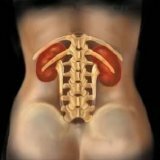Kidney disease in children

Unfortunately, no one is immune from kidney disease. Kidney diseases also occur in children, we will consider some of them. The adaptive capacity of children is not high enough, especially during periods of maturation - from birth to 3 years, from four to eight years, in adolescence. In such periods, the risk of developing kidney disease in children is increased, especially in those children whose parents suffer from kidney pathologies.
Renal insufficiency in children
The manifestation of this kidney disease is in children oliguria, or even anuria( when the urine is less than half a liter a day).In children, there are violations in the activity of water-electrolyte balance, in the work of the cardiovascular system. If the treatment of renal failure is started on time, everything comes to normal within 2 weeks. The most important thing is the treatment of the underlying disease. In acute severe renal failure, specialists prescribe hemodialysis.
Due to such diseases in children as pyelonephritis, glomerulonephritis, amyloidosis of the kidneys develop chronic liver failure. Other systemic diseases lead to the onset of this syndrome.
Urolithiasis in children
Urolithiasis is a renal kidney disease in children, as stones are formed in the urinary organs. This ailment in children is common, but since this parents can not notice, in children, urolithiasis is revealed in neglected form.
Pain in the lumbar region is accompanied by clinical manifestations, in the urine often there is blood. Often, small stones come out themselves, accompanied by a sharp pain. In children with this kidney disease, often the urge to urinate ends up ineffectively. The stone exits the kidney, which leads to kidney colic. Urine accumulates in the kidney itself. Diagnose the disease on the basis of the child's complaints, conduct urine and blood tests, review urography, ultrasound of the bladder and kidneys.
Disease in children is like jade
Nephritis in children is any inflammation of the kidneys. Acute nephritis occurs when there is a foci of infection in the child's body, or because of the transmitted infectious diseases. Predisposition to the development of nephritis in children is created by the following factors: wet shoes, severe hypothermia, wind. Measles, scarlet fever and other diseases often give complications to the kidneys.
Children with this kidney disease complain of pain in the lower back, a general malaise. Swelling can be observed throughout the body, pressure may be increased, the amount of urine released decreases, and changes in urine analysis occur. The treatment of the disease is quite long( 1-3 months), but the prognosis is favorable.
Tuberculosis of kidneys in children
This disease in children is a complication of pulmonary tuberculosis. Treatment of tuberculosis is honored by chemotherapy, specific anti-tuberculosis drugs.
This disease is asymptomatic for a long time, it is not always detected in the analyzes, so the disease is difficult to identify. It is necessary in groups of risk, which includes kiddies, patients with tuberculosis of other organs, to conduct periodic examination. The risk group also includes children with kidney complications in certain diseases, children with impaired functions of the genitourinary organs. There are diseases in which the risk of developing tuberculosis of the kidneys is very high. These include anomalies in the development of the kidneys after a complicated birth, with pyelonephritis.
Pyelonephritis in children
Pyelonephritis in children is a nonspecific common inflammation of the kidneys, in which the renal pelvis( pyelitis) can be affected. The kidneys and parenchyma of the kidneys are also affected.
There is a pyelonephritis one-sided and two-sided, and differs due to the reasons of education( secondary and primary).This disease is acute and chronic. Subdivided pyelonephritis by the method of getting the causative agent into the kidney, because it can be iritogenic and hematogenous( with blood).
Children with this disease complain of pain in the area of the kidney located on the side of the lesion. Pain more often stupid, but at times can be paroxysmal( speak in this case about calculous pyelonephritis).Children develop symptoms of general intoxication. For the diagnosis of this kidney disease, blood and urine tests are performed in children.



